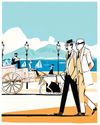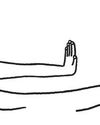
One morning in June, before dawn, cyclists began gathering at an intersection in Emporia, Kansas, to remember the victim of a recent murder. These were professional athletes as well as serious amateurs, on high-end bikes that click-clicked loudly while coming to a stop. The riders hugged; their bike lights blinked. By five-thirty, a few dozen women and men had collected in the dark.
These cyclists had travelled to Emporia to compete in races the following day, in which most of them would ride for two hundred miles, on rolling unpaved roads, for at least nine and a half hours. The event is the biggest in the new niche sport of gravel-bike racing a form of slog that presents itself as both a solo endurance test and a party in the mud. "Gravel" became a cycling term only about a decade ago, to describe machines that are a compromise, in weight and handling, between road bikes and mountain bikes.
Gravel bikes, and gravel racing, have since proliferated-at a time when American participation in racing of the Lance Armstrong kind (skinnier tires, lighter frames) has been in decline. Indeed, the Kansas event, Unbound Gravel, can now fairly describe itself as the most important in all of American competitive cycling-even if many of the hundreds who pay to ride in it each year have little competitive ambition beyond not giving up. Like a big-city marathon, a typical gravel race is both an élite contest and, at the rear, something less pressing. Gravel evangelists sometimes like to compare this mix to a mullet haircut: "Business at the front, party at the back." Emporia, a low-rise college town, had been filling with video crews and podcasters. Banners printed with the muddy faces of past winners hung from street lamps. The manufacturers of rival anti-chafing creams had set up stands.
Bu hikaye The New Yorker dergisinin November 14, 2022 sayısından alınmıştır.
Start your 7-day Magzter GOLD free trial to access thousands of curated premium stories, and 9,000+ magazines and newspapers.
Already a subscriber ? Giriş Yap
Bu hikaye The New Yorker dergisinin November 14, 2022 sayısından alınmıştır.
Start your 7-day Magzter GOLD free trial to access thousands of curated premium stories, and 9,000+ magazines and newspapers.
Already a subscriber? Giriş Yap

BADDIE ISSUES
\"Wicked\" and \"Gladiator II.\"

LET'S MAKE A DEAL
\"Death Becomes Her\" and \"Burnout Paradise.\"

ANTI HEROES
\"The Franchise,\" on HBO.

FELLOW-TRAVELLERS
The surprisingly sunny origins of the Frankfurt School.

NOW YOU SEE ME
John Singer Sargent's strange, slippery portraits of an art dealer's family.

PARIS FRIEND - SHUANG XUETAO
Xiaoguo had a terror of thirst, so he kept a glass of water on the table beside his hospital bed. As soon as it was empty, he asked me to refill it. I wanted to warn him that this was unhealthy - guzzling water all night long puts pressure on the kidneys, and pissing that much couldn't be good for his injury. He was tall, though, so I decided his insides could probably cope.

WILD SIDE
Is Lake Tahoe's bear boom getting out of hand?

GETTING A GRIP
Robots learn to use their hands.

WITHHOLDING SEX FROM MY WIFE
In the wake of [the] election, progressive women, who are outraged over Donald Trump's victory at the ballot box, have taken to social media with public, vengeful vows of chastity. - The Free Press.

DEADLINE EXTENSION
Old age, reborn.